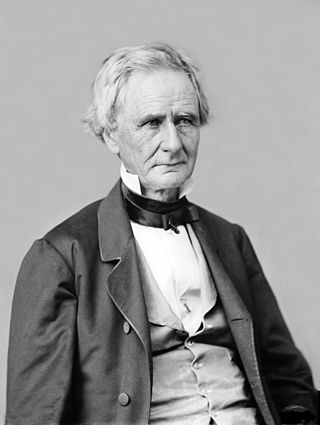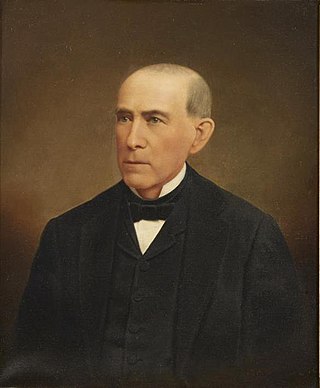
Greene County is a county in the Commonwealth of Pennsylvania. As of the 2020 census,the population was 35,954. Its county seat is Waynesburg. Greene County was created on February 9,1796,from part of Washington County and named for General Nathanael Greene. The county is part of the Southwest Pennsylvania region of the state. Greene County is part of the Pittsburgh media market. It is in the area of southwestern Pennsylvania that was claimed by Virginia,the District of West Augusta.

Waynesburg is a borough in and the county seat of Greene County,Pennsylvania,United States,about 50 miles (80 km) south of Pittsburgh. Its population was 4,006 at the 2020 census.

Simon Cameron was an American businessman and politician who represented Pennsylvania in the United States Senate and served as United States Secretary of War under President Abraham Lincoln at the start of the American Civil War.

William Freame Johnston was the 11th governor of Pennsylvania,from 1848 to 1852. A lawyer by training,Johnston became district attorney of Westmoreland County at the age of 21 in 1829. He was elected to the Pennsylvania state legislature and switched from the Democratic Party to the Whig Party in 1847 to run for the Pennsylvania Senate.

William Bigler was an American politician from Pennsylvania who served as a Democrat as the 12th governor of Pennsylvania from 1852 to 1855 and as a member of the United States Senate for Pennsylvania from 1856 to 1861. His older brother,John Bigler,was elected governor of California during the same period. As of 2023,he is the last Democratic incumbent to lose reelection as Governor of Pennsylvania.

Albert Baird Cummins was an American lawyer and politician. He was the 18th governor of Iowa,elected to three consecutive terms and U.S. Senator for Iowa,serving for 18 years. Cummins was a leader of the Progressive movement in Washington and Iowa. He fought to break up monopolies. Cummins' successes included establishing the direct primary to allow voters to select candidates instead of bosses;outlawing free railroad passes for politicians;imposing a two-cent street railway maximum fare;and abolishing corporate campaign contributions. He tried,with less success,to lower the high protective tariff in Washington.

Charles Jared Ingersoll was an American lawyer,writer and politician who served as a Democratic member of the U.S. House of Representatives for Pennsylvania's 1st congressional district from 1813 to 1815,Pennsylvania's 3rd congressional district from 1841 to 1843 and Pennsylvania's 4th congressional district from 1843 to 1849. He served as a member of the Pennsylvania House of Representatives in 1830.

James Campbell was a politician from Philadelphia,Pennsylvania. He served as Attorney-General of Pennsylvania and United States Postmaster General during the presidency of Franklin Pierce.

The state superintendent of public instruction (SPI) of California is the nonpartisan elected executive officer of the California Department of Education. The SPI directs all functions of the Department of Education,executes policies set by the California State Board of Education,and also heads and chairs the Board. The superintendent is elected to a four-year term,serves as the state's chief spokesperson for public schools,provides education policy and direction to local school districts,and also serves as an ex officio member of governing boards of the state's higher education system. The current superintendent of public instruction is Tony Thurmond.

The Waynesburg and Washington Railroad was a twenty-eight-mile,three-foot gauge subsidiary of the Pennsylvania Railroad. It started because of the boom in oil and gas,helped all of the natural resource industries to grow and spurred an increase in population in Waynesburg,Pennsylvania. Coal was already being mined on the eastern end of the county near the river.
More than 1,500 African American officeholders served during the Reconstruction era (1865–1877) and in the years after Reconstruction before white supremacy,disenfranchisement,and the Democratic Party fully reasserted control in Southern states. Historian Canter Brown Jr. noted that in some states,such as Florida,the highest number of African Americans were elected or appointed to offices after the end of Reconstruction in 1877. The following is a partial list of notable African American officeholders from the end of the Civil War until before 1900. Dates listed are the year that a term states or the range of years served if multiple terms.

The OregonDepartment of Education is the department responsible for implementing Oregon's public education policies,including academic standards and testing,credentials,and other matters not reserved to the local districts and boards. The department is overseen by the Governor,acting as State Superintendent of Public Instruction. Agencies of the department include the Chief Education Office,the Early Learning Division,the Higher Education Coordinating Commission,the State Board of Education,and the Youth Development Division. The key roles of the agency include setting test standards and graduation requirements for statewide uniformity.
The Edwards–Lincoln–Porter family is a family of politicians from the United States.

The 1856–57 United States Senate elections were held on various dates in various states. As these U.S. Senate elections were prior to the ratification of the Seventeenth Amendment in 1913,senators were chosen by state legislatures. Senators were elected over a wide range of time throughout 1856 and 1857,and a seat may have been filled months late or remained vacant due to legislative deadlock. In these elections,terms were up for the senators in Class 1.

The 1856 United States Senate election in Pennsylvania was held on January 14,1856. William Bigler was elected by the Pennsylvania General Assembly to the United States Senate.
The Kentucky Department of Education (KY DOE) is an agency within the government of Kentucky that is responsible for regulating education in the state.

The North Carolina General Assembly of 1868–1869 met in Raleigh from November 16,1868,to April 12,1869,with a special session from July 1,1868,to August 24,1868. This was the first assembly to meet after the approval of the new Constitution of North Carolina in 1868. As prescribed in this constitution,the assembly consisted of the 120 members in the North Carolina House of Representatives and 43 senators in the North Carolina Senate elected by the voters on August 6,1868. This assembly was in control of the Republican Party and was dominated by reconstruction era politics.
This local electoral calendar for 2022 lists the subnational elections held in 2022. Referendums,recall and retention elections,and national by-elections are also included.













